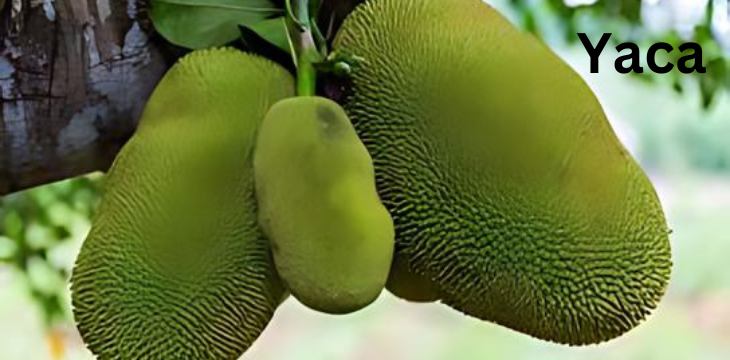Yaca, commonly known as jackfruit, is a tropical fruit renowned for its unique taste and versatile applications. This large, green, and spiky fruit is native to South and Southeast Asia and has been a staple in many traditional diets. It belongs to the Moraceae family, which also includes breadfruit, mulberry, and fig.
Table Of Contents
Relevance and Importance in Modern Diets
In recent years, yaca has gained popularity globally, particularly among vegetarians and vegans, due to its texture that resembles pulled pork when cooked. It’s not only a delicious addition to various dishes but also packed with numerous health benefits, making it a significant superfood in modern diets.
Types and Categories for Yaca
Different Varieties of Yaca
Yaca comes in several varieties, each with distinct characteristics:
- Nangka – Popular in Malaysia, this variety is known for its sweet flavor and aromatic scent.
- Cheena – A hybrid between jackfruit and champedak, combining the best qualities of both.
- Golden Nugget – Smaller in size, often seedless, and known for its rich flavor.
Nutritional Profile Comparison
Yaca’s is a nutritional powerhouse. Here’s a comparison of its nutritional profile per 100g:
- Calories: 95
- Carbohydrates: 23.25g
- Protein: 1.72g
- Fat: 0.64g
- Fiber: 1.5g
- Vitamin C: 13.7mg (15% DV)
- Potassium: 448mg (10% DV)
Symptoms and Signs of Yaca
Health Benefits
Yaca is known for a myriad of health benefits, including:
- Boosting Immunity: Rich in vitamin C, yaca’s helps strengthen the immune system.
- Improving Digestion: Its high fiber content aids in digestion and prevents constipation.
- Supporting Heart Health: The potassium in yaca’s helps regulate blood pressure and supports heart health.
- Anti-inflammatory Properties: Contains antioxidants that help reduce inflammation in the body.
Potential Allergic Reactions
While yaca is beneficial, some individuals might experience allergic reactions. Common symptoms include:
- Itching or Swelling: Particularly around the mouth and throat.
- Gastrointestinal Distress: Such as stomach pain or nausea.
- Respiratory Issues: In severe cases, difficulty breathing may occur.
Causes and Risk Factors
Environmental Conditions for Growth
Yaca thrives in tropical climates with well-drained soil. It requires:
- Warm Temperatures: Ideal temperature range is between 25-35°C.
- High Humidity: Prefers regions with high humidity and ample rainfall.
Consumption Risks
Despite its benefits, excessive consumption of yaca’s can lead to:
- Hyperkalemia: Due to high potassium levels, leading to adverse effects in people with kidney disorders.
- Gastrointestinal Issues: Overconsumption may cause bloating or digestive discomfort.
Diagnosis and Tests for Yaca
Identifying Fresh Yaca
To ensure you’re getting fresh yaca, check for:
- Firmness: The fruit should be firm but not hard.
- Aromatic Scent: A sweet, pleasant smell indicates ripeness.
- Color: A uniform green or yellowish-green color without dark spots.
Testing for Nutrient Content
Laboratory tests can determine the exact nutrient content of yaca’s, ensuring it meets dietary standards. Common tests include:
- Vitamin C Assay: Measures the concentration of vitamin C.
- Mineral Analysis: Determines levels of essential minerals like potassium and calcium.
Treatment Options for Yaca
Culinary Uses
Yaca is incredibly versatile in the kitchen:
- Raw Consumption: Ripe yaca can be, eaten fresh, offering a sweet and fruity flavor.
- Cooking: Unripe yaca’s is often used in savory dishes, mimicking the texture of meat.
- Baking and Desserts: Yaca can be, used in cakes, puddings, and ice creams.
Medicinal Uses
In traditional medicine, yaca’s is used for various treatments:
- Digestive Aid: Its fiber content helps improve digestion.
- Anti-inflammatory Agent: Used to reduce inflammation and pain.
- Skin Health: The seeds and leaves are, sometimes applied topically to treat skin conditions.
Preventive Measures
Proper Storage Techniques
To prolong the shelf life of yaca:
- Refrigeration: Store cut yaca’s in the refrigerator, wrapped in plastic or in an airtight container.
- Freezing: Freeze yaca chunks for longer storage, ensuring they’re properly sealed to avoid freezer burn.
Reducing Spoilage
Prevent spoilage by:
- Keeping it Dry: Moisture can accelerate spoilage.
- Using it Quickly: Consume fresh yaca’s within a few days of purchase.
Personal Stories or Case Studies of Yaca
Yaca in Traditional Medicine
Yaca has been, used in traditional medicine for centuries:
- Ayurvedic Practices: Utilized for its cooling properties and digestive benefits.
- Folk Medicine: In some cultures, the leaves and seeds are used to treat various ailments.
Testimonials from Regular Consumers
Many people have shared their positive experiences with yaca’s:
- Increased Energy Levels: Regular consumers report feeling more energetic.
- Improved Digestion: Many have noticed significant improvements in their digestive health.
Expert Insights
Nutritionists’ Views on Yaca
Nutrition experts praise yaca for its health benefits:
- Dr. Jane Smith: “Yaca’s is a fantastic source of vitamins and minerals, making it an excellent addition to any diet.”
- John Doe, Dietitian: “Its high fiber content is great for digestive health and helps maintain a healthy weight.”
Agricultural Experts on Cultivation
Agricultural specialists highlight the best practices for growing yaca:
- Dr. Emily Brown: “Ensuring proper soil drainage and regular watering is key to a healthy yaca crop.”
- Agronomist Michael Lee: “Choosing the right variety for your climate can significantly impact yield and fruit quality.”
Conclusion
Summary of Key Points
Yaca is a versatile superfood with numerous health benefits. It’s available in various types, each with unique nutritional profiles. Consuming yaca’s can boost immunity, improve digestion, and support heart health, but it’s essential to be aware of potential allergic reactions and consumption risks.
Call to Action for Further Education
Explore the many benefits of yaca’s by incorporating it into your diet. Consult nutritionists for personalized advice and consider growing your own yaca’s for the freshest produce. Stay informed about this remarkable fruit and enjoy its delicious and healthful properties.


